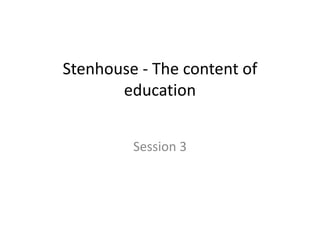Stenhouse the content of education 2 - session 3 (1)
This document discusses different perspectives on the content of education from curriculum theorists like Stenhouse, Ralf Tyler, Brunner, Schwab, Phenix, and Hirst. Stenhouse notes the sociological approach which sees knowledge as non-neutral and serving dominant groups, and the philosophical approach which emphasizes the objective structure and nature of knowledge itself. The philosophical view leads to a disciplinary-based curriculum aimed at understanding reality. Theorists like Brunner, Phenix, and Hirst argue for teaching the disciplines as they reveal structured, teachable forms of knowledge and enable students to understand each subject's concepts, logical structure, and methods of inquiry. While this risks social class patterns, issues of boredom

Recommended
Recommended
More Related Content
What's hot
What's hot (20)
Similar to Stenhouse the content of education 2 - session 3 (1)
Similar to Stenhouse the content of education 2 - session 3 (1) (20)
Recently uploaded
Recently uploaded (20)
Stenhouse the content of education 2 - session 3 (1)
- 1. Stenhouse - The content of education Session 3
- 2. Introduction 1 • All of us have opinions about what the content of the curriculum should be. For example, economic skills should be taught to be able to get a job. Indigenous knowledge should be taught. Subjects should be taught. Everyday knowledge Practical knowledge
- 3. Introduction 2 • What do you think should be taught? Why?
- 4. Introduction 3 • What are your views on the current CAPS? • What’s wrong with it? • What are its strengths?
- 5. Stenhouse • The content of education. • Notion of ‘worthwhile knowledge’
- 6. • Assume that you are a curriculum planner – • 1. Would you select knowledge on the basis of social relevance and pupil interest and then introduce worthwhile knowledge? Why? • 2. Would you select ‘worthwhile’ subject knowledge and try to interest pupils in it? Why?
- 7. • The school has the task of making available to the young a selection of society’s intellectual, emotional and technical capital.
- 8. • Stenhouse calls this public knowledge or public traditions • Schools teach a variety of public traditions – bodies of knowledge or academic disciplines, arts, skills, languages,
- 9. • Also referred to as elements in culture • The school cannot transmit the entire culture – • as it selects should it follow the principle of relevance or interest and try to guide pupils to what is ultimately worthwhile. OR • should it choose what is judged worthwhile and attempt to teach it so that it invokes students interest.
- 10. Stenhouse writes about the content of education – what ought to be taught and why. • He notes the sociological approach to knowledge and the philosophical approach to knowledge. The sociological approach highlights • that knowledge is not neutral, • that dominant forms of knowledge are biased, • That dominant group’s knowledge is selected • that this knowledge serves the interests of dominant groups, So key questions are • whose knowledge counts as knowledge? • Whose interest is served?
- 11. The philosophical approach emphasizes • The structure and nature of knowledge itself • that worthwhile knowledge is objective, • and is not dependent on the whims of politicians, • demands of society • or the whims of learners • Most important is for students to learn the ‘truth about reality’. • This would lead to understanding of society and its change. • The philosophers, Hirst, Peters, Phenix, Brunner provide different reasons for a disciplinary based curriculum.
- 12. Ralf Tyler • The disciplines should be taught – they ought to be the primary knowledge resource • Aim is to understand each discipline • Why: each is an active effort to make sense of the world • Not just a collection of facts although most teachers teach it as such • Argues for close contact between teachers and those who produce knowledge in the discipline
- 13. Brunner • Knowledge seen as subjects – each with own method and structure • Aim in school is to enable understanding of the subjects • Its underlying principles and structure • Random topics outside the context of a subject are not good, because - Do not allow for generalization or transfer to new situations -No intellectual excitement -The lack of structure and connection leads to forgetting • To reduce memory loss – teach the structure of the subject, connections necessary • Motivation and retention enabled • Facilitates understanding • Although flawed it’s the best we have
- 14. Schwab • Notes the changing nature of knowledge that its tentative • Difference between facts and meaningful knowledge • Facts can be memorized – meaning making requires understanding
- 15. Phenix • Bases his view on realms of meaning • Humans have power to experience meaning • Education – teach children to give meaning to existence • The curriculum must only teach knowledge from the disciplines • Because it reveals knowledge in teachable form • Guide children in learning the process of inquiry of each discipline
- 16. Hirst • Stresses the tests for truth claims in the various disciplines • Identifies forms and fields of knowledge • Forms: eg. History, maths, physical science, etc. • These have their own distinct concepts and meanings • Distinct logical structure • Distinct tests for truth claims • Distinct modes of inquiry or methods • Fields – inter-disciplinary – 2 types – theoretical and practical • Geography – theoretical • Engineering – practical, curriculums studies
- 17. • Moral issue: Social class patterns with this kind of subject content based curriculum. • Issue of boredom: A problem of teaching/pedagogy and not content • Thinking about curriculum is thinking about knowledge
